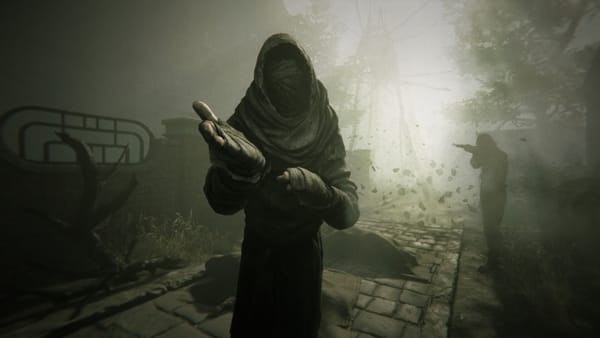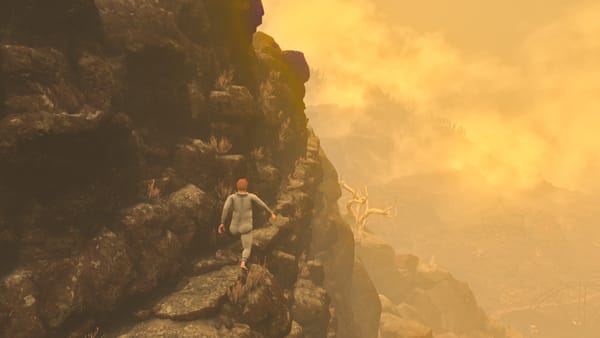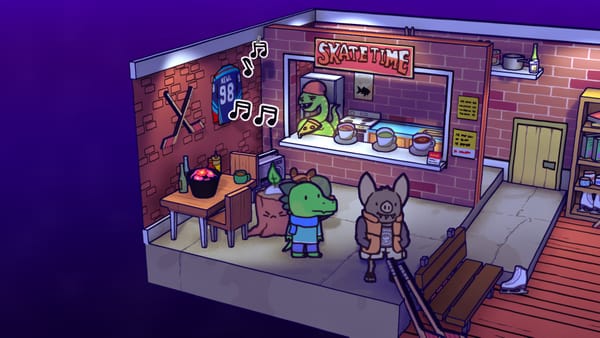What's The Line?
An explosive moment in 1000xResist lays bare the complexities of violence and rebellion.
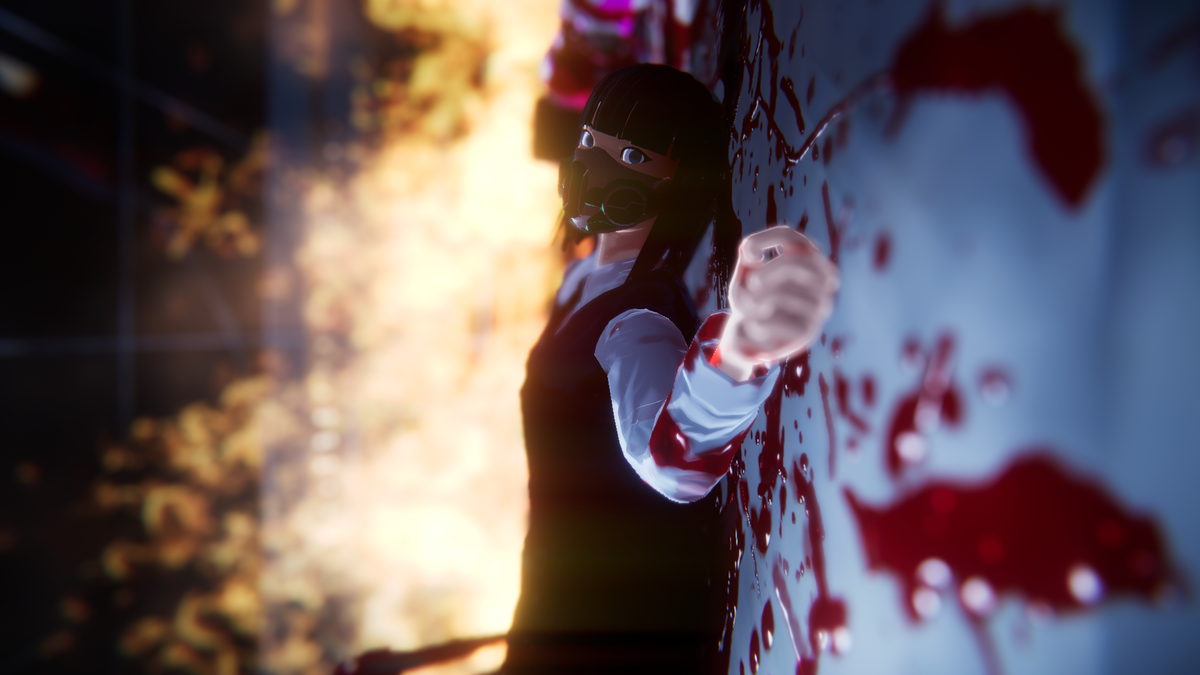
I don’t breathe well during plays. Yes, incredible performances on stage can sometimes knock the wind out of me, but it’s really the live aspect that has me on edge. Plays have that unique quality of living and dying in front of the viewer with each showing, unlike a movie or TV show where you can reasonably expect the same thing upon a rewatch. Each night is a special affair with a different audience, new contexts, and a version of the show that could only be seen right then and there.
Despite having seen several plays go off without a hitch, I have a hard time quelling the inner voice that is convinced something will go terribly wrong. It is constantly wondering: What if someone forgets a line? What if the power goes out? What if someone manages to run on stage? What if there’s a medical emergency? What-if after what-if can plague me throughout an entire show, as some part of me waits for the lights to drop on the cast and ruin the whole affair. These worries are usually unwarranted and never become more than a symptom of my anxiety, but they found validity while watching Principal’s play unfold in Chapter 6 of 1000x Resist. After all, I was the one with the bomb’s trigger in my hand.
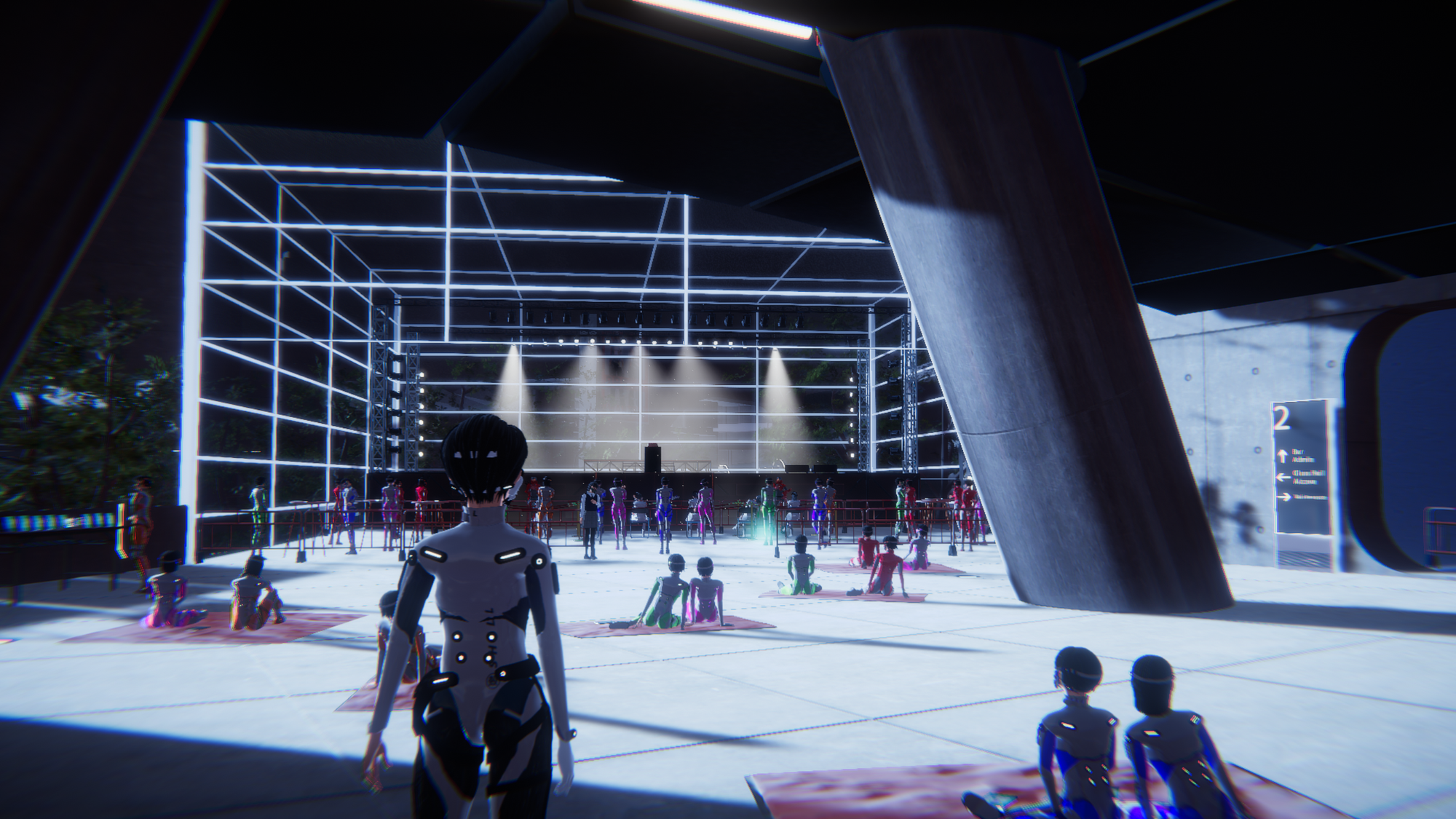
1000x Resist is an intimidating video game to describe. Throwing a label at the debut game from sunset visitor 斜陽過客 feels like dooming a reader to focusing on the small parts of a huge picture. How does one delve into the unnervingly accurate way this game captures the feelings of paranoia and isolation brought on by the COVID-19 pandemic, while then giving appropriate space to the generational trauma it covers through a tale about a young girl called Iris, her thousands of worshiping clones vying to become Shaped Sisters named by their function, and the curse of being what remains after the apocalypse? What can be shared that relates this Peabody Award winning game’s ability to make you laugh your ass off in one breath, then reflect on your own life in another, then break your heart and mind in one more?
It feels like there are as many ways to talk about 1000x Resist as there are copies of Iris. When faced with a video game like this, I’ve found it best to save tackling the sum after a lot of distance, and instead break down my favorite parts that capture some of its themes’ intersections. So, with just over a year passing since the game's release, let’s talk about the play that preceded societal collapse.
The stage play takes place at a crucial moment of 1000x Resist. By the time the character you inhabit, an Iris who later chooses the name Blue, takes her viewing spot in front of the stage, an astonishing amount has happened. The status quo established at the game’s beginning has been shattered. Earlier, you play as Watcher, one of the many members of a society of Iris clones that worship the original as ALLMOTHER. You have communions with your fellow Shaped Sisters where you dive into ALLMOTHER's memories to better understand her and your role. Years have passed since an Occupant, the otherworldly beings who spread the world-ending sickness, attacked and massacred dozens of Irises in their home, the Orchard. A disillusioned Watcher is missing in action after killing the ALLMOTHER. Using the vacancy left by their dead goddess, an older Sister called Principal, alongside the High Minister (formerly Knower), has instilled an authoritarian regime called the Provisional Government.
The society is further segregated into those who live upstairs in the Orchard and those kept downstairs in a city, dubbed Old Town, that is reminiscent of Hong Kong; clones of Iris’ long-dead maybe friend/mostly admirer, Jiao, are made for labor and kept outside the Orchard; a new police force called the Red Sisters, who directly report to Prinicpal, ensure that all dissidents are met with imprisonment or worse. Blue wants to see the upstairs, thinking it holds potential for a more meaningful life, but she quickly experiences disillusionment after the Provisional Government murders her close friend and employer, Bartender. Her crime? Being from the previous era and not pretending otherwise. It is this act, and the lies fed to Blue about the bullets in her friend's back, that turns her into the trigger for a plot that existed well before she decided to take action. With her newfound upstairs privileges ("Someone needs to tend the bar," as High Minister/Knower put it), Blue becomes the perfect operative to bomb the annual stage play of ALLMOTHER's supposed last wishes.
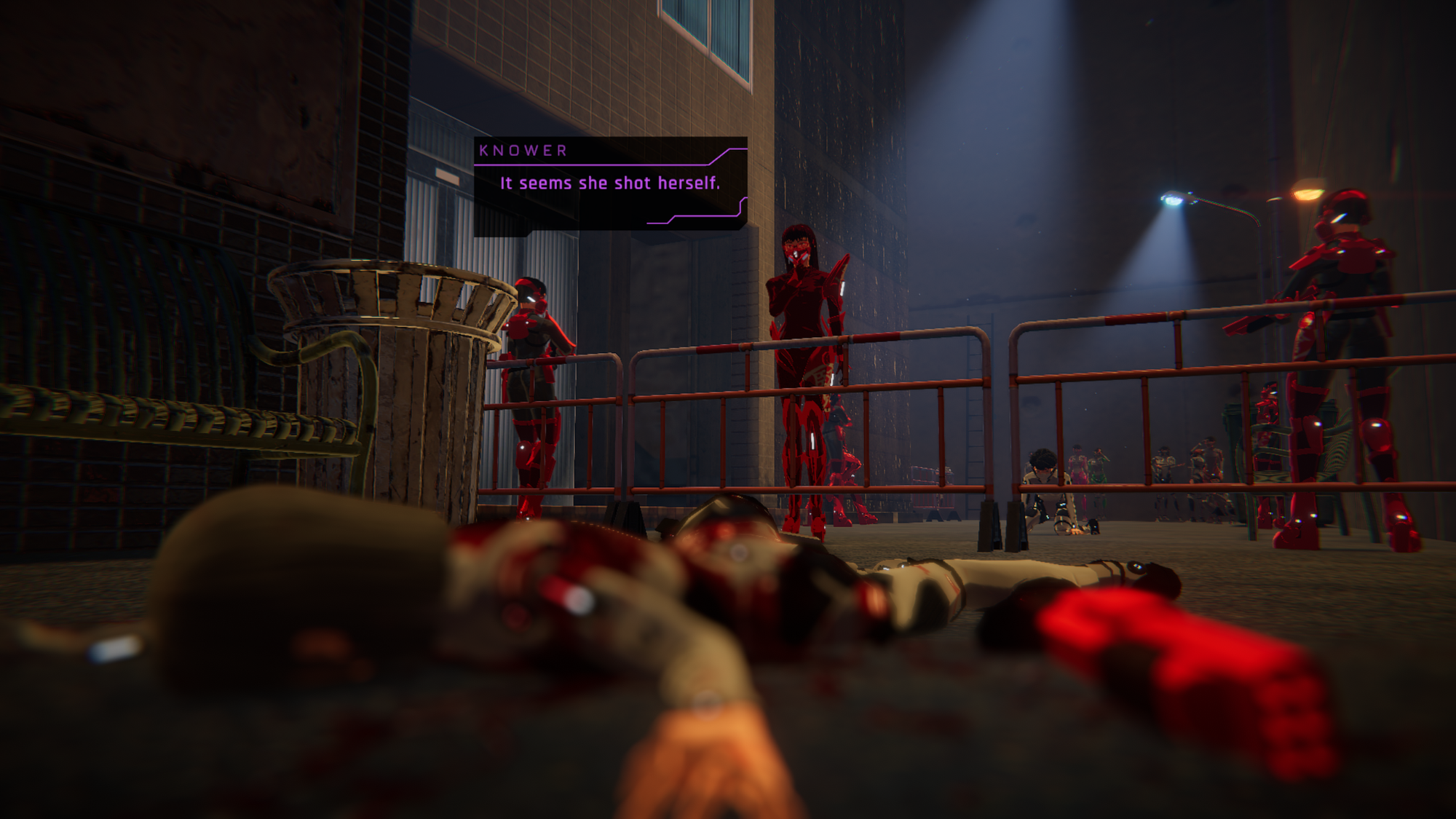
While the closed superstructure that the original Iris maintained for centuries has changed, her clones still can’t beat their habit of thinking in functions. In the play’s case, Principal created it to rewrite history and ingrain new facts into the populace. It is one of many uncomfortable parallels 1000x Resist has with the real world. It is the authoritarian playbook to make their new regime appear timeless, their misdeeds a matter of often-repeated facts. For example, many United States government officials, local and national, have been eager to fall in line with the Trump administration, excited by its promises or believing loyalty will pay off despite evidence that it won’t, and do quite a lot to create a version of history POTUS prefers. This has included Oklahoma’s Superintendent of Public Instruction requiring social studies courses to include debunked 2020 conspiracy theories, a failed attempt at replacing facts about the Underground Railroad, the erasure of transgender people’s presence at the Stonewall Uprising, and still more. The game’s release precedes these actions, but their seeds were planted (and telegraphed) before it.
When the violence of a new regime blooms into its full rotting effect, protest often follows. However, protest may not fully capture the impact your character Blue has in mind. This newly-named Iris isn’t the only one invested in destroying Principal’s regime, and other forces — including those leftover from the previous era, underappreciated Jiao-types, religious fanatics, and disgruntled soldiers who think not enough change has occurred — see her fresh hurt as an opportunity to make it happen. They are all uneasy allies, but are willing to work together to bring the Provisional Government down.
With all this background, Blue and any sympathetic player will be filled with a rage-fueled vengeance by the time the curtains rise. The play’s beginning does nothing to assuage this anger, as each lie after lie only continues to irritate in a way only those who know the truth could understand. I found it to be an emotional experience, not just because of this high-production gaslighting but also due to the building tension from Blue’s mission. I knew how this play ended. Once again, I could feel that familiar lack of oxygen.
And then, in the middle of this dynamic, gross retelling of events I just played, right after Principal appears on stage to fulfill her self-appointed part, an Iris on stage asks Principal for her line. She had forgotten it, the cherry on top of bad acting telegraphed by good voice acting. Watching that ‘(whisper) Line’ caption appear was a bomb in its own right. The tension was shattered, the silence broken by my laughter. Because honestly, who has the audacity to ask a dictator for their lines? Despite the word’s simplicity, it is easily one of my favorite moments in the game. It is both explosive and disarming.
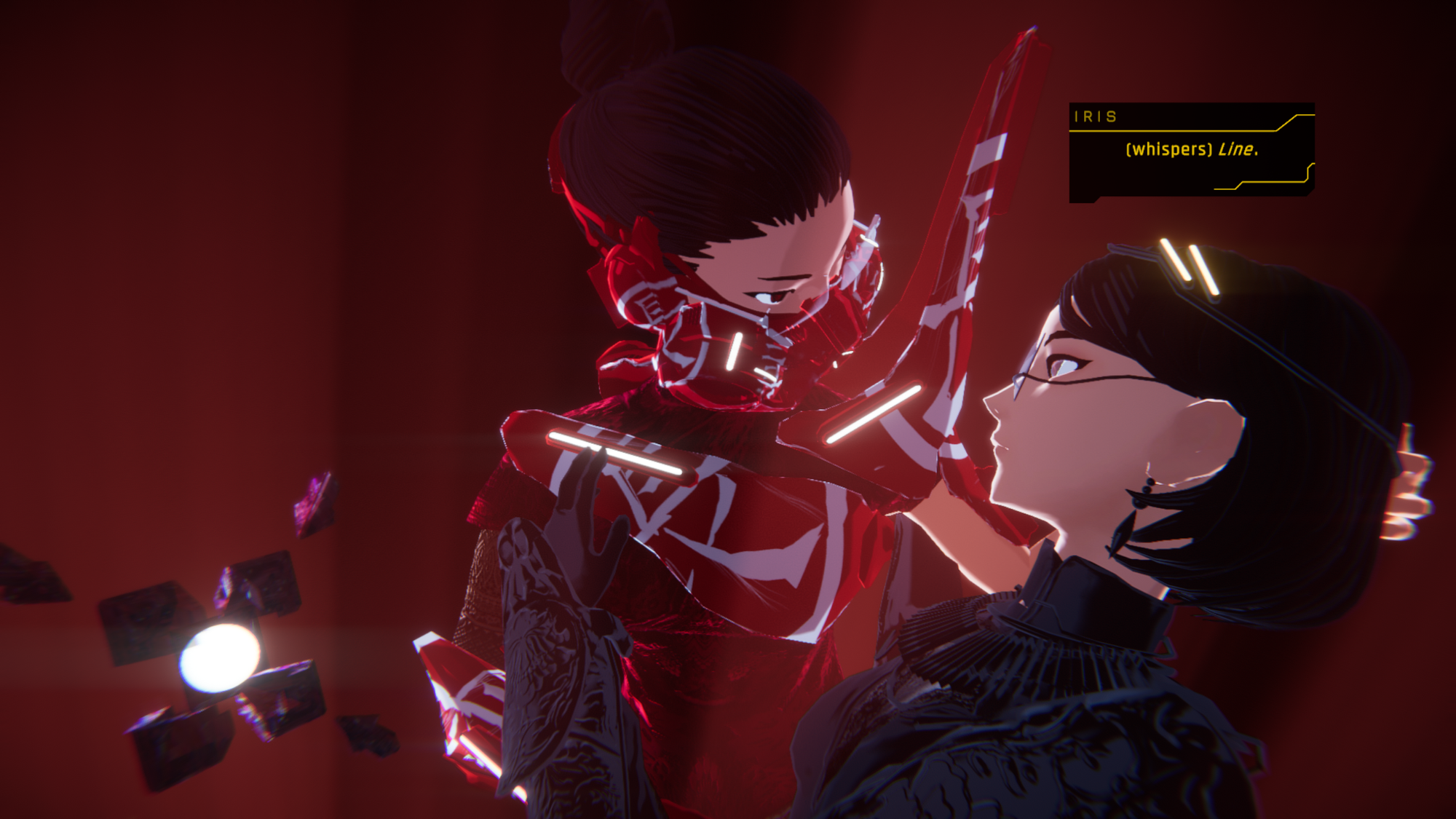
On the one hand, this hushed request mid-play highlights how fragile the whole affair is. This is not an event so old that it can be easily quoted by any Iris, even one who rehearsed her lines. Much like the regime it aims to solidify, the play has visible weak points, and while it’s tempting to call the Iris who forgot her lines the weakest link, it is Principal’s unraveling soon after that earns her the title. This meltdown from Principal could be an article in and of itself, as it is one of 1000x Resist’s strongest displays of what comes from complex relationships between mothers with high expectations and daughters doomed from trying to meet them, but just know it’s certifiably unhinged. It is a significantly larger detour from the event than asking for a line. No matter the production value, it was obvious our dictator was barely keeping things together. My inner voice was screaming that a play had never been easier to disrupt.
But on the other hand, this surprise laugh also serves as an interrogation of Blue’s mission. It is following this whisper of ‘Line’ that the decision to blow up the play and irreversibly change the game’s course (again) appears. For me, a decision that felt necessary not even ten minutes ago suddenly felt not only optional, but possibly excessive. It all became more human. More lies did follow this blip in the performance, but my perception was changed. It was no longer just the start of a revolution that a grieving Blue was prepared to die for, but the moments before a bloodbath of the people who wronged Blue and the people who just happened to be there. It was a reminder that no matter my intentions, or how deserving Principal was of a punishment, this was a violent act. And historically speaking, violence always entangles those who never intended to be involved. Blue was about to put someone through the awfulness she had just experienced.
No matter how a player decides to navigate the scene, its construction is an incredibly effective way of questioning what it can mean to resist. While there is leeway on how long you can hear your enemy (crash) out, it doesn’t allow you to ignore how human your enemy is, or the people who will be caught up in your vengeance, or the consequences of a pressed button. There is no actual choice in whether or not you blow up the play, simply options that briefly delay the inevitable. Players must sit with what happens when they participate in an attack.
It is shocking to wake from the bomb’s detonation and be greeted with a bloody Jiao corpse. My stomach churned at the huddles of shocked faces and lines of still bodies. It’s no mistake that all this occurs in the first person either, a stark perspective change from the third-person over-the-shoulder view I had prior. The game wanted me to feel this moment. It wanted me to think about the reasons behind this, to interrogate what validates hurting someone. My inner voice was right, and I still found it hard to breathe.
![Blue ready to pull the trigger, with options displaying from top to bottom: "[press switch]," "[end this]," [for her]"](https://www.stopcar.ing/content/images/2025/05/Blue-pulling-the-trigger-1.png)
A video I’ve thought about the more I look back on the play is “Was John Brown Right? Was He Effective?” from the YouTube channel Atun-Shei Films. It is a companion piece to the video immediately preceding it, “Holy Horror: A New History of John Brown's Raid (feat. InRangeTV)”, where they dive deep into the erratic abolitionist’s raid on Harper’s Ferry in 1859. While the context of American chattel slavery is wildly different from what takes place in 1000x Resist, the discussion of violent rebellion has much to be gleaned from. One thing is the framing of Jon Brown’s actions as a response to mass violence rather than the spark of it. As it relates to 1000x Resist, there is an argument to be made that Blue did not start the violence, but responded to the violent conditions she and her loved ones were already subjected to. However, the video does not let this logic negate the trauma and pain this response will cause for an enemy's loved ones.
The fact that has stuck with me most from the video is that the first casualty of John Brown’s raid was an uninvolved, freed black man named Heyward Shepherd. Heyward Shepherd was not a part of anyone’s plan, and yet he still suffered the consequences of rebellion. He was there because it was his job as baggage master to be. Despite John Brown’s intentions, ones that allowed him to call Frederick Douglass and General Harriet Tubman comrades, his actions still hurt the group of people he was willing to die for. And even this is just one aspect of a raid that, despite its long-term impact, was itself a failure.
Much like the aftermath of John Brown’s raid, no one really claps Blue on the back for blowing up the play. It interfered with other hidden plots, and the people who assisted Blue aren’t particularly happy with the fallout either. It certainly doesn't help that no one expected her to survive, including herself. Despite the undeniable change ushered in by Blue’s act, it was hard to feel good about the choice. And for me, it’s because I couldn’t stop thinking about who was likely its first casualty. An Iris who made me laugh with a whisper, one who was excited to perform in a play. An Iris who rehearsed her lines and still floundered, as people do. An Iris coerced into repeating off-script lines for a dictator losing her mind. An Iris who was now the cost of violence.
For the interrogation of violent action it inspires, the play is one of my favorite moments in 1000x Resist. It has all the drama I expect from a theatrical performance, enveloping all bearing witness to it, while challenging me with questions about what Blue and I have done. It’s easy for violence to enter the discussion when it comes to rebellion, in no small part because of its use in almost all successful revolutions and systemic changes. It isn't lost on me that the only reason I have any of the liberties I enjoy today is because my ancestors and their diverse set of imperfect allies took up arms against their oppressors, not because the government grew a conscience and changed legislation, or because the general public voted it in. But there is a reason violence is often treated as the last resort. Time and time again, it ropes people on and off the stage into its clutches, many of whom are left not breathing at all once the curtain drops.
Stop Caring is reader supported and 100% free. Please consider subscribing or making a one-time donation to make more of this possible. All donations on this article go directly to the author.
If you are interested in writing for Stop Caring, please reach out via the email listed on the contact page or dm Artemis on Blue Sky. Stop Caring offers compensation, complete creative freedom, and no deadlines. All it asks for in return is open communication, no pieces that promote discrimination against vulnerable groups, and please, for the love of God, leave that AI shit at the door.

